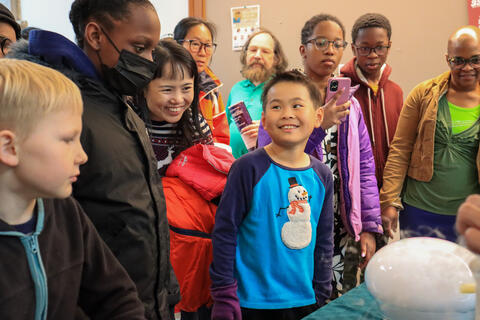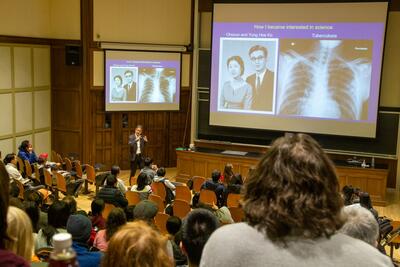
Science on Saturdays returned from the COVID hiatus with a bang – figuratively and literally. While 83 K-12 students and their families filled up the great hall of the Sterling Chemistry Laboratory at the April 8 event, a loud pop came from the air pressure demo table. The surrounding crowd of children gasped in wonder while many more experimented at the 17 other science demo tables.
They visited Yale Chemistry to learn about science through hands-on demonstrations led by passionate Yale faculty and graduate student chemists and through a timely lecture by special guest speaker Dr. Albert Ko.
“It’s really great to finally be back in person after the pandemic,” said Kurt W. Zilm, William K. Lanman Professor of Chemistry, chair of Yale University Department of Chemistry, event organizer, and host. “Children gain so much more with hands-on experiences in science than seeing them on a screen.”

Participants learned about topics – like air pressure, latent volatility, and conservation of angular momentum – in fun and exciting ways. At one table, children watched a marshmallow chick shrink inside a vacuum chamber with the removal of air. At another, eyes widened as a paper towel dipped in a mixture of water and isopropanol withstood burning flames. And at yet another station, a child sat on a spinning chair holding a spinning wheel turned in the opposite direction of the wheel as the forces canceled each other out.
To further ignite their passion for science, Dr. Albert Ko, an infectious disease specialist and epidemiologist, covered the topic on everybody’s mind – the pandemic. He explained how epidemiologists apply science to protect people from epidemics.
“Our goal is to use science to control disease and protect the population from current and future health threats,” said Ko, the Raj and Indra Nooyi Professor of Public Health at the Yale School of Public Health.
 To the crowd of attentive, young minds, he covered the gamut of infectious disease control, from a timeline of public health in the U.S. since 1900 to interventions used to prevent the spread of disease and tackle new threats. He explained the scientific achievements during the pandemic, like rapid tests, water sewer surveillance, safe and effective vaccines, and more. Dr. Ko also spoke about the populations that suffered the most at the beginning and how public health activation led by science changed that in later phases of the pandemic.
To the crowd of attentive, young minds, he covered the gamut of infectious disease control, from a timeline of public health in the U.S. since 1900 to interventions used to prevent the spread of disease and tackle new threats. He explained the scientific achievements during the pandemic, like rapid tests, water sewer surveillance, safe and effective vaccines, and more. Dr. Ko also spoke about the populations that suffered the most at the beginning and how public health activation led by science changed that in later phases of the pandemic.
He impressed upon them that they, too, could drive science to save lives and urged them to “go after” the important questions of our time outlined in the UN Sustainable Development Goals.
“How do we reduce inequalities? How do we reduce poverty? How do we mitigate hunger? How do we address climate change? How do we do affordable and clean energy,” said Ko. “Those are the key issues for your generation.
You are the future leaders, and we will need more and more scientists like you to advise leaders, such as the governor or the president, about what’s the best way to move forward. So, your role in society is enormous!”

About Science on Saturdays
Established in 2005, Science on Saturdays has shared the work of over 75 Yale faculty with the public. The program has been organized and hosted by Chemistry Chair Kurt W. Zilm since 2010 with the help of the Yale Office of New Haven Affairs’ Pathways to Science initiative. Dr. Ko’s lecture and past lectures can be viewed on the Science on Saturdays at Yale YouTube channel.